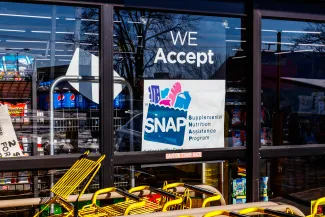
298,000 Coloradans relying on food assistance could see benefit cuts
Click play to listen to this article.
Nearly 300,000 Coloradans who depend on the Supplemental Nutrition Assistance Program to meet their basic nutrition needs are expected to lose some or all benefits under the tax and spending bill passed by Republicans in Congress, according to new Urban Institute analysis.
Cuts to the program formerly known as food stamps will affect some 16 million children, 8 million seniors, and 4 million adults with disabilities nationwide.

Anya Rose, public policy director with Hunger Free Colorado, said SNAP dollars help low-income families in all corners of the state afford groceries.
"We should be investing in programs like SNAP that have long-term savings, as they improve economic and educational and health outcomes," said Rose. "Not cutting resources that help our communities thrive, ultimately to line the pockets of the wealthiest in our country."
Republican lawmakers say the new law, which extends tax cuts passed under the first Trump administration, will reform the nation's social safety net and help reduce what they describe as unsustainable federal spending.
The measure also expands work requirements for SNAP recipients up to the age of 65, a move Republicans argue will help end dependency on government programs.
Rose noted that the new law provides no funds for job training or placement services, making it harder for Coloradans to find stable employment.
She said the measure also does nothing to lower SNAP's costs, and Colorado will now face $175 million in new, unfunded obligations.
"This is not saving money or imposing fiscal discipline," said Rose. "It is forcing states to cover the bill, and removing the resources that states and counties would need to effectively and accurately implement the program."
Because Colorado's Taxpayer's Bill of Rights limits how the state can raise new revenues, Rose said she believes the state could face impossible choices - restrict SNAP eligibility, make enrollment more difficult, or opt out of the program entirely.
"If we have to cover these big new unexpected costs that are really important to bringing resources to our communities," said Rose, "we have very few options."
















